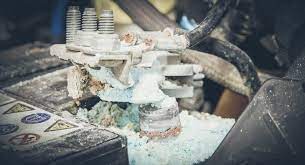A car battery is a common source of frustration for many drivers. A dead or dying battery can leave you stranded on the side of the road, and it will cost you money to have it fixed. Fortunately, there are some simple things that you can do yourself to prolong your car’s battery life and keep it from dying in the first place. One thing that might be harming your car’s battery is acid leaking from its cells. In this article, we’ll explain what causes acid leaks and how they affect batteries, as well as how to spot one if your own car needs a fix!
What causes car batteries to leak acid?
Car batteries contain a mixture of water and acid with lead plates inside. The battery charges with electricity from the car’s alternator, which separates the electrons long enough for them to mix with both the water and acid. This is what creates an electrical charge that can run your car.
Over time, this mixture begins generating gas bubbles as it loses its strength, creating a buildup at the top of the battery that must be released or else you are in danger of having an explosion occur. To prevent these explosions, most manufacturers use vents near the top where all the gases are released directly outside of your car so they don’t build up inside your engine compartment.
Leaking from the vents might not happen as frequently as it would with battery acid, but most batteries have a valve you can open to drain any buildup. If your car is experiencing problems with your electrical system or if you’ve noticed a condition where the engine is turning over slowly or not at all, this could be a sign of a faulty battery. It’s recommended that you have it checked out right away so damage to other components doesn’t occur.
In some cases, your vent caps might also become loose and allow acid to seep out onto the ground where it will create puddles that can corrode anything they touch. These are usually easy enough to tighten back into place before they fall off completely. Some batteries produce more acid during an average day than others because the amount of charge they contain varies between models, so be sure to check your manual and look under the hood for any warning signs.
What are the signs of a car battery leaking acid
The car battery will have a bad smell and the acid may leak from the seams of the battery cover or a leakage surface.
If you’ve been hearing odd gurgling, sloshing, sucking sounds coming from under your hood for a little while now, it doesn’t necessarily mean that there’s anything wrong with your engine. In fact, those gurgling sounds can be as simple as small amounts of acid leaking from your car battery. Normally when you’re starting up the engine on a morning before work and leaving for work if you’re getting those unusual sloshing sounds then this is an indication that there’s corrosion happening inside your car’s charging system and ultimately what this means is that you might need to
Why does car battery leaking acid
The battery acid isn’t just leaking, it may be overflowing and causing the car to corrode.
An alkaline car battery can deteriorate if not recharged quickly after a discharge. Over time, the lead plates in the battery will be covered with sulfate which reduces capacity and causes loss of power when trying to start a vehicle. If left unattended for too long it will coat all of the surfaces inside your engine compartment including your alternator, generator, and regulator which leads to corrosion that damages parts internally that don’t come into contact with acid where you’re able to clean them off externally.
How can you prevent battery leaking acid
There are a few potential ways to avoid battery leaking acid. One of the most common is to insert paper towels inside cases that contain wet cells. Another method is removing the top piece on cars with head gaskets, which prevents gas from escaping through the battery vents. If you’re installing new batteries, it’s possible that heat can be an issue for drivers in southern states. Altering the ventilation system of your automobile could help address this by reducing wear and tear caused by high temperatures.
Conclusion
The most common cause of battery acid leaks is an improperly sealed or loose cell cover. If your car battery has been leaking, you should have it inspected by a professional to ensure there isn’t any damage that needs repairing.

